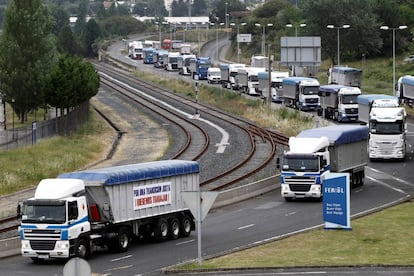Spain turns its back on coal, as use of the fossil fuel falls to historic lows
May and June saw the lowest levels of consumption for electricity generation since records began, helped by the low cost of natural gas and environmental taxes


It is not raining, there is less wind and the reservoirs are drying up. Summer is not a good time of year for renewables, and so the chimneys in the coal-fueled power stations of Spain should be belching out smoke right now as usual. And yet the use of this highly contaminating fossil fuel has hit a historic low. Not since the first official records began in 1990 has coal constituted such a small percentage of the electricity mix on mainland Spain.
In May, coal power stations contributed just 1.7% to electricity on the Spanish mainland
According to data from the Spanish Electric Network (REE), the use of coal to generate electricity has never been lower than the months of May and June this year. In May, coal-fired power stations contributed just 1.7% to electricity on the Spanish mainland and 2.1% in June. With the inclusion of the Canary and Balearic Islands, Ceuta and Melilla, the percentage rose marginally to 2.3% in May and 2.5% in June, with May 8 the day the least coal-fired electricity was used – just 1.5%, a figure not recorded since 2011.
The coal power station in As Pones in A Coruña is the biggest in Spain but according to its owner, utility company Endesa, it has spent entire weeks idle since April. “This has never happened before,” says a spokesperson.
The fallout has meant that around 150 transport workers who drive the coal from the port to the power station have been out of work for almost two months.
The tax on CO2 in the European coal market is very high and now stands above €26 per ton released into the atmosphere
For a power station using imported coal, this lack of activity was not part of the government’s vision. Like the rest of the power stations that burn imported coal in Spain, it had undergone decontamination modifications in order to continue to operate beyond 2020, according to EU regulations. In fact, the government’s current plans envision all power stations using imported coal continuing to operate for the next 10 years.
But a number of factors are contributing to coal-generated electricity’s demise in Spain and in several other European countries too. On the one hand, the price of emitting CO2 in the European coal market is very high and now stands above €26 per ton released into the atmosphere. As coal power stations are the worst culprits, they are the most heavily penalized. Though natural gas power stations also release CO2, the emissions are less than half those of coal.
Natural gas is picking up the slack from the coal industry in Spain
In fact, natural gas is picking up the slack from the coal industry in Spain, which means the combined systems that have been underused for years are now feeding into the national grid at historic highs.
Sources within the sector indicate that another factor contributing to the demise of coal-generated power is the competitive price of gas. This means the so-called “green cent” tax, which the government abolished for gas but maintained for coal, is also having an impact.
The fallout
While the government has moved to close power stations dependent on subsidized national coal, the seven installations that use imported coal were to be kept running. But the administration had not foreseen this drastic drop in imported coal-fired electricity, which is, in theory, profitable.
As far as both the national mines and the power stations using national coal are concerned, the last government drew up a compensation package for workers that did not include employees linked to the imported coal power stations – such as the transport workers who are descending with their vehicles on Madrid in protest and who plan to meet with representatives of the Ministry for Ecological Transition this Tuesday.
The good news is that, if the situation continues, the low levels of carbon dioxide emissions could also hit a milestone. Within the electricity sector, coal is the country’s main culprit for greenhouse gases.
English version by Heather Galloway.
Tu suscripción se está usando en otro dispositivo
¿Quieres añadir otro usuario a tu suscripción?
Si continúas leyendo en este dispositivo, no se podrá leer en el otro.
FlechaTu suscripción se está usando en otro dispositivo y solo puedes acceder a EL PAÍS desde un dispositivo a la vez.
Si quieres compartir tu cuenta, cambia tu suscripción a la modalidad Premium, así podrás añadir otro usuario. Cada uno accederá con su propia cuenta de email, lo que os permitirá personalizar vuestra experiencia en EL PAÍS.
¿Tienes una suscripción de empresa? Accede aquí para contratar más cuentas.
En el caso de no saber quién está usando tu cuenta, te recomendamos cambiar tu contraseña aquí.
Si decides continuar compartiendo tu cuenta, este mensaje se mostrará en tu dispositivo y en el de la otra persona que está usando tu cuenta de forma indefinida, afectando a tu experiencia de lectura. Puedes consultar aquí los términos y condiciones de la suscripción digital.








































